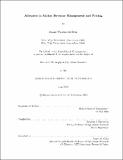Advances in airline revenue management and pricing
Author(s)
Boer, Sanne Vincent de, 1976-
DownloadFull printable version (5.637Mb)
Other Contributors
Massachusetts Institute of Technology. Operations Research Center.
Advisor
Dimitris J. Bertsimas.
Terms of use
Metadata
Show full item recordAbstract
We propose new models and optimization methods for airline revenue management and pricing. In the first part of this thesis, we study the dynamic inventory control problem for a single flight under imperfect market segmentation, when customers book the lowest available class whose restrictions they can satisfy and whose fare they are willing to pay. We derive theoretical properties of the value functions and optimal policy for a generic single-resource revenue management problem, of which this problem is a special case. Numerical examples show that adjusting the booking policy for imperfections of the market segmentation leads to significant revenue gains. In the second part, we study the impact of dynamic capacity management on airline seat inventory control. Through better matching the supply and demand for seats the airline is able to carry more passengers, and the revenue management policy should be adjusted accordingly. We propose a derivative of the widely used EMSRb booking limit calculation method that takes into account the effect of future capacity changes, which can lead to significant revenue gains. In the third part, we propose a simulation-based optimization approach for seat inventory control in a network environment. Starting with any nested booking-limit policy, we combine a stochastic gradient algorithm and approximate dynamic programming ideas to improve the initial booking limits. Numerical experiments suggest that the proposed algorithm can lead to practically significant revenue enhancements. In the fourth part, -we study a joint pricing and resource allocation probleml in a network with applications to production planning and airline revenue management. We show that the objective function reduces to a convex optimization problem for certain types of demand distributions, which is tractable for large instances. (cont.) We propose several approaches for dynamic picing and resource allocation. Numerical experiments suggest that coordination of pricing and resource allocation policies in a network while taking into account the uncertainty of demand can lead to significant revenue gains. Finally, in our conclusions we propose an integrated approach to airline revenue management that combines all four aspects that we studied here, and suggest directions for future research.
Description
Thesis (Ph. D.)--Massachusetts Institute of Technology, Sloan School of Management, Operations Research Center, 2003. Includes bibliographical references (p. 160-168). This electronic version was submitted by the student author. The certified thesis is available in the Institute Archives and Special Collections.
Date issued
2003Department
Massachusetts Institute of Technology. Operations Research Center; Sloan School of ManagementPublisher
Massachusetts Institute of Technology
Keywords
Operations Research Center.